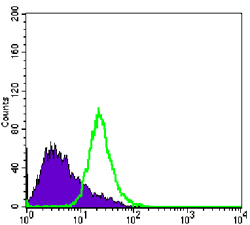Nkx-3.1 Monoclonal Antibody
- Catalog No.:YM0477
- Applications:WB;IHC;IF;FCM;ELISA
- Reactivity:Human
- Target:
- NKX3.1
- Fields:
- >>Pathways in cancer;>>Prostate cancer
- Gene Name:
- NKX3-1
- Protein Name:
- Homeobox protein Nkx-3.1
- Human Gene Id:
- 4824
- Human Swiss Prot No:
- Q99801
- Mouse Swiss Prot No:
- P97436
- Immunogen:
- Purified recombinant fragment of human Nkx-3.1 expressed in E. Coli.
- Specificity:
- Nkx-3.1 Monoclonal Antibody detects endogenous levels of Nkx-3.1 protein.
- Formulation:
- Liquid in PBS containing 50% glycerol, 0.5% BSA and 0.02% sodium azide.
- Source:
- Monoclonal, Mouse
- Dilution:
- WB 1:500 - 1:2000. IHC 1:200 - 1:1000. Flow cytometry: 1:200 - 1:400. ELISA: 1:10000.. IF 1:50-200
- Purification:
- Affinity purification
- Storage Stability:
- -15°C to -25°C/1 year(Do not lower than -25°C)
- Other Name:
- NKX3-1;NKX3.1;NKX3A;Homeobox protein Nkx-3.1;Homeobox protein NK-3 homolog A
- Molecular Weight(Da):
- 26kD
- References:
- 1. Exp Mol Med. 2006 Dec 31;38(6):625-33.
2. Exp Biol Med (Maywood). 2008 Mar;233(3):297-309.
3.Mol Biol Rep. 2010 Mar;37(3):1505-12.
- Background:
- This gene encodes a homeobox-containing transcription factor. This transcription factor functions as a negative regulator of epithelial cell growth in prostate tissue. Aberrant expression of this gene is associated with prostate tumor progression. Alternate splicing results in multiple transcript variants of this gene. [provided by RefSeq, Jan 2012],
- Function:
- alternative products:Additional isoforms seem to exist,disease:NKX3-1 has been thought to be one of the target gene of the 8p21 loss of heterozygosity, common in prostate cancer, but neither disruption of the coding region of the gene, nor mutations have been found in prostate cancer.,function:Transcription factor, which binds preferentially the consensus sequence 5'-TAAGT[AG]-3' and can behave as a transcriptional repressor. Could play an important role in regulating proliferation of glandular epithelium and in the formation of ducts in prostate.,induction:By androgens and, in the LNCAP cell line, by estrogens. Androgenic control may be lost in prostate cancer cells during tumor progression from an androgen-dependent to an androgen-independent phase.,similarity:Belongs to the NK-3 homeobox family.,similarity:Contains 1 homeobox DNA-binding domain.,subunit:Interacts with serum response f
- Subcellular Location:
- Nucleus .
- Expression:
- Highly expressed in the prostate and, at a lower level, in the testis.
- June 19-2018
- WESTERN IMMUNOBLOTTING PROTOCOL
- June 19-2018
- IMMUNOHISTOCHEMISTRY-PARAFFIN PROTOCOL
- June 19-2018
- IMMUNOFLUORESCENCE PROTOCOL
- September 08-2020
- FLOW-CYTOMEYRT-PROTOCOL
- May 20-2022
- Cell-Based ELISA│解您多样本WB检测之困扰
- July 13-2018
- CELL-BASED-ELISA-PROTOCOL-FOR-ACETYL-PROTEIN
- July 13-2018
- CELL-BASED-ELISA-PROTOCOL-FOR-PHOSPHO-PROTEIN
- July 13-2018
- Antibody-FAQs
- Products Images

- Western Blot analysis using Nkx-3.1 Monoclonal Antibody against LNCaP (1) cell lysate.

- Immunohistochemistry analysis of paraffin-embedded human prostata tissues (A, B) with DAB staining using Nkx-3.1 Monoclonal Antibody.

- Flow cytometric analysis of PC-3 cells using Nkx-3.1 Monoclonal Antibody (green) and negative control (purple).



